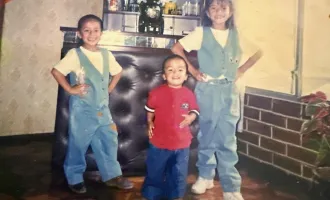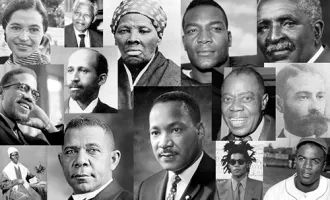
This Date in UCSF History: Fighting for Civil Rights
Originally published in Synapse on February 1, 1979.
President Carter in his State of the Union address Wednesday, called for a “New Foundation” — “building a world where every child is nurtured and can look to the future for hope.”
On Friday night, the United League of Mississippi (ULM) addressed a crowd of 1,000 in East Oakland challenging the reality of this “new foundation” for Blacks and other Third World people in America.
The ULM is a militant Black organization fighting discrimination in the south.
“In the last few years Blacks have lost more than they’ve gained,” stated Skip Robinson, ULM President. “Black youths go to schools and can’t get jobs. Throughout the country, Blacks are working in hamburger stands with college degrees.”
A similar message was conveyed by Robinson when he spoke to UCSF students and workers at a noon-time presentation the previous Monday.
ULM fighting racism
The ULM was visiting the Bay Area last week to raise money and to educate people in order “to shatter Carter’s myth of the ‘new south’.” The Anti Bakke Decision Coalition (ABDC) organized the tour.
Started in 1967, in Holly Springs, Mississippi, the ULM first organized the Black community to oppose court ordered desegregation plans.
According to Robinson, the local all-white school boards were trying to “integrate the schools without giving the Black community any control.”
“Part of the desegregation plan was the wholesale removal of Black principals, teachers and counselors from the public schools.” said Robinson. “The ULM organized an effective boycott to ensure the retention of these Black educators,” he added.
Since that time, the League has expanded its program to “oppose all forms of discrimination.”
The ULM now has a membership of over 50,000 people from 15 counties in Mississippi and parts of Tennessee and Alabama. ULM’s efforts include organizing demonstrations and economic boycotts of southern businesses and institutions that discriminate; filing affirmative action suits against companies charging discrimination in hiring and promotion; protesting to halt police brutality and XXX terror; demanding the return of land that has been lost by poor Blacks in the south due to the tax structure and the influence of large corporations.
Don’t believe Carter
ULM attorney Louis Meyers pointed out that Blacks have little reason to believe Carter’s “new foundation” speech.
In Carter’s “new south,” he said,
- The median income of Blacks in the south is half that of whites.
- Black unemployment is upwards of 25 percent.
- Blacks are being driven off the land — 1,000 acres are being lost each week. At the same time,
“General Motors set up nine of its ten newest plants in the south’,” said Robinson. “Profits from the giant manufacturers with plants in the south increased from $350 million in 1963 to $1.3 billion in 1976, a 400 percent increase, while wages increased only 160 percent.”
Another speaker, Reverend Coleman from the AME Zion Church in Oakland, emphasized that “Black progress was an illusion.”
“Go down to East 14th street in East Oakland — all the Black shops there have closed up,” he said. “Housing and Federal Welfare are two illusions of Black progress in the 60s. Everybody had a piece of the action, but the same folk controlled the act.”
To combat this continuing oppression, the ULM’s Meyers emphasized that the ULM program reflected the desires of Black people in the south for “self-determination — the right to determine our own future.”
To accomplish this, the ULM major demand is to “return land to Black people and to prevent the further loss of land in the South. Without the land we have no base, no power, and we’re nobody,” Robinson said.
A slide show presented at Friday night’s talk chronicled the history of Black oppression. The resolution of the civil war that promised each black freed man “would get 40 acres of land and a mule” was betrayed.
Reconstruction was subverted and Blacks were driven back to the plantations, enslaved under the system of sharecropping and debt farming. Continuing today, Robinson explained that Blacks are still being driven off their land by large corporation tactics, and through the manipulation of the Blacks who have not been given the education to understand how the laws and “justice” are being used against them.
The people forced off the land “legally” then provide a cheap source of labor. (This accounts for the fact that 9 out of 10 of General Motor’s newest plants have been built in the south.)
Companies such as JP Stevens continue to have enormous clout politically and economically with unions unable to get a foothold with them. Unsafe working conditions, poor wages, and the promise of unemployment with any resistance have resulted, it was said.
Gained attention
Last March, when thousands of people demonstrated against the shooting of a Black man by a white man in Tupelo, Miss., the United League gained nationwide attention for the dramatic resurgence of an active Black freedom movement. However, the League sees the necessity of attacking brutality far beyond the issue of the Klan. As Skip Robinson said, “If you eliminate the Klan today and the Nazis tonight, the problem will still be there in the morning.”
What is the problem? The problem as defined by the League is one of deep racism. And it is a problem that is not endemic to the south.
This problem was best summed up by the ULM’s Meyers when he said of racism in California, “In a lot of ways it all started out here. You would think from how people talk about racism that Bakke was from Tennessee. A lot of things bad are started here. The problem we face with Mississippi is the problem Blacks face in L.A., Oakland and Kentucky. Wherever we are, we are oppressed and must struggle.”



